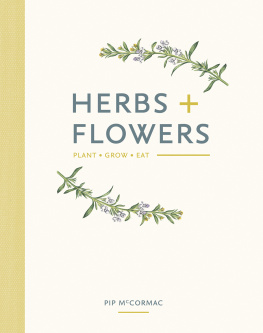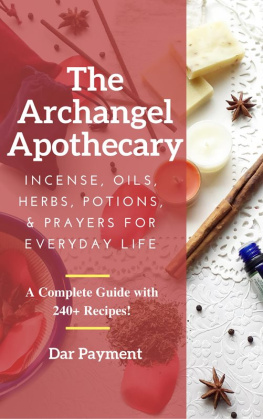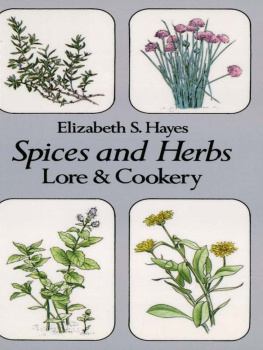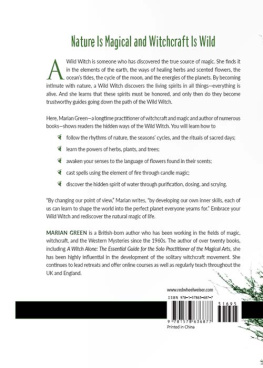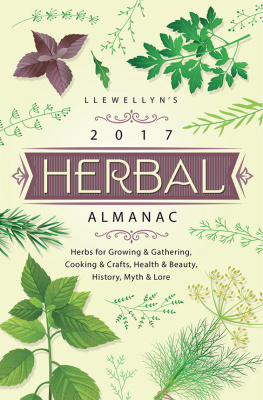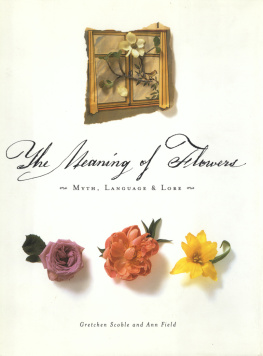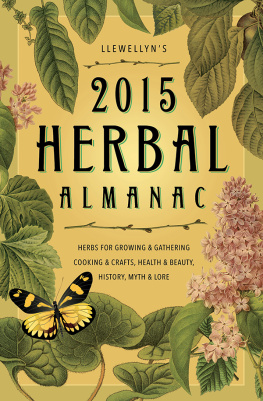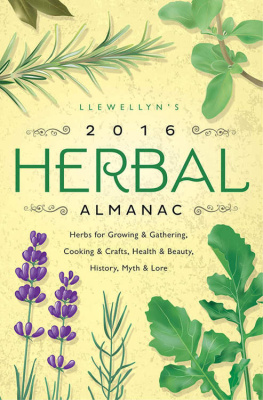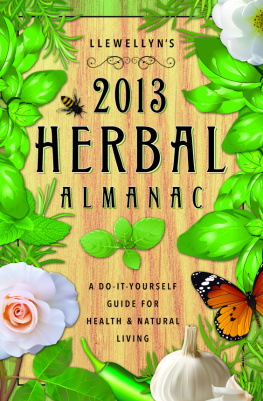

To Matt, Kyle, and Nicole, for all your love and support GS
For Clive, who continues to inspire AF

Copyright 2001 by Gretchen Scoble & Ann Field.
Illustrations copyright 2001 by Ann Field.
Calligraphy text copyright 2001 by Elvis Swift.
All rights reserved. No part of this book may be reproduced in any form without written permission from the publisher.
Library of Congress Cataloging-in-Publication Data:
Scoble, Gretchen. The meaning of herbs: myth, language & lore / Gretchen Scoble and Ann Field; text by Ann Fiery; photography by Holly Lindem.
p. cm.
ISBN 978-0-8118-3031-7 (hc)
ISBN 978-1-4521-4091-9 (epub, mobi)
1. Herbs-Folklore. I. Field, Ann. II. Fiery, Ann. III. Title.
GR780.S42 2000
363.368-dc21
00-060129
CIP
Book and cover design by Gretchen Scoble
Calligraphy by Elvis Swift
Distributed in Canada by Raincoast Books
9050 Shaughnessy Street, Vancouver, British Columbia V6P 6E5
Chronicle Books LLC
85 Second Street
San Francisco, California 94105
www.chroniclebooks.com
In the theater of the garden, the flowers are the prima donnas. Brilliant and effusive, they lure us with their spectacles of color and entertain us with their wanton smells. But there, nestled next to the floral extravaganza, is the herb garden, smaller, perhaps, and more delicately scented but carrying within it a secret history, a lineage of magic, myth, and meaning that reaches back through millennia to the most ancient civilizations on earth. We all know that herbs provide us with rich and savory flavors for our meals, heady perfumes for our gardens and homes, and homey remedies for our aches and pains, but according to ancient wisdom, herbs were also essential for magical potions and love charms, for calling up fairies and elves, for keeping warm or cooling down, for ensuring immortality, for soothing the baby, for making wine.
In addition to such practical applications, each herb told a story or held a meaning within its fragrant leaves. The bay, for example, was worn as a crown by Apollo in honor of the lovely Daphne, who was transformed into a bay tree as he pursued her; accordingly, the wreath of bay leaves became the symbol of honor for Roman generals and emperors. Like a flower, an herb tucked into a bouquet, however inconspicuous it may look, carries with it a cache of meaninga simple stem of chamomile suggests patience in adversity, while a sprig of verbena represents sensitivity, and rosemary is the sign of remembrance.
Treasured by the cook, beloved by the gardener, cherished by the healer, the humble herb is the practical, plain cousin of the floweror is it? The line that demarcates herb from flower is in truth nonexistent, which is why youll find rose, poppy, foxglove, and other constituents of the floral population in this book. Officially, an herb is defined as a plant without woody tissues, meaning, more or less, that any plant thats not a tree, bush, or shrub is an herb. More traditionally, an herb is defined by its uses: plants employed in the kitchen and the medicine chest are herbs, and plants that are merely ornamental are flowers. Of course, it was only by longand occasionally dangerousexperimentation that the culinary or medicinal attributes of a given plant were established. Beginning in the Middle Ages, naturalists began compiling catalogues of information about herbs in order to pass along the results of that experimentation. These books, called herbals (hard h optional), combined all the best qualities of the cookbook, first-aid kit, advice column, gardening manual, and tall tale into one fabulous volume. In a herbal a typical entry for a given herb would include a description of the herbs behavior in the garden, instructions for using it to repel witches, a prescription for its application to various wounds, a recipe containing it, an explanation of how to make a hair tonic, and a few extra bits of general advice about life. It is on such marvelous models that we have patterned this book, including a bit of gardening lore here, a touch of cooking wisdom there, a couple of compelling remedies, and the occasional antique legend.
The herb garden has its secrets, and those who would journey along its shady paths and ancient byways will find this a useful handbook for their travels.

[Coriandrum sativum]
The leaf of the coriander plant constitutes an herb in its own rightcilantro, or Chinese parsleywhile the seed, whole or ground, has been used in cooking for over five thousand years, making the plant as a whole extraordinarily valuable to the chef. Coriander makes an appearance in the Old Testament, where it is compared to the manna that God provided for the Israelites in their wanderings.
The seeds are used in the manufacture of gin and were mentioned in the Arabian Nights as having aphrodisiac qualities, but coriander is considered a witchs herb in England. Its magical reputation may stem from the fact that it has a nasty aroma until its seeds ripen, when its scent suddenlymagicallychanges to a pleasant one. Perhaps this is also the source of corianders meaning in the Victorian language of flowers: hidden merit.
Coriander is rather slow to grow and likes plenty of sun, but it will repay attention by supplying an aromatic bounty to the cook.

[Petroselinum species]
The humble sprig of parsley that huddles ignominiously on restaurant plates marks a sad decline in the fortunes of this herb, which was held in such esteem by the ancient Greeks that they wreathed their victorious athletes in parsley and crowned bridesmaids with circlets of parsley and hyacinth. Parsley was dedicated to Persephone, the queen of the underworld, and parsley seed was believed to go back and forth to and from Hades nine times before sprouting, which accounts for its long germinating period. The association with the underworld made parsley an herb of death; corpses were draped in parsley garlands. The Romans were fond of parsley: they spread it on their bread for breakfast, threw parsley seeds into their fish ponds to cure sickly fish, and wore it around their necks when they went drinking to dispel intoxication.
In the middle ages, parsley was believed to be the central ingredient in the potion that witches rubbed on their brooms to make them fly. In England, parsleys ragged leaves were attributed to pixies, who tore them up as a punishment to those would replace tulip beds with the more utilitarian kitchen garden, tulips being the cradles for pixie babies.
Next page

